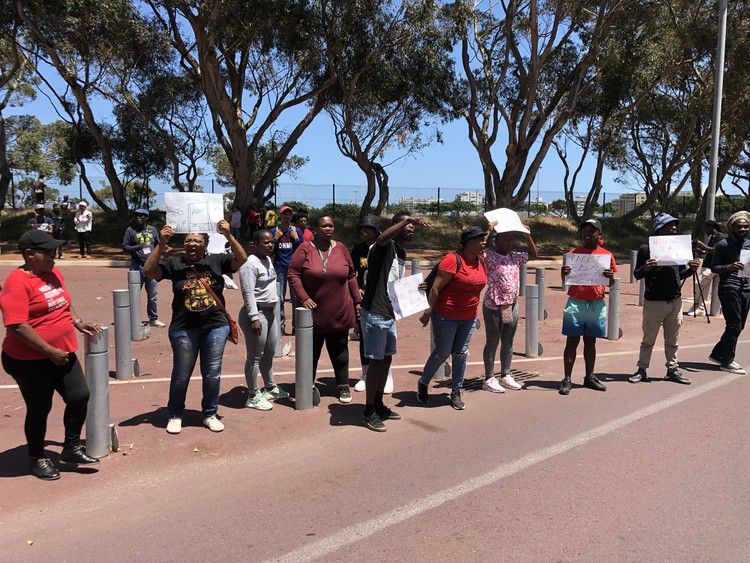
24 November 2023
About 30 picketers demonstrated at the DHL Stadium in Green Point, Cape Town in an attempt to halt the auction of City-owned properties in New Church Street. Photos: Mary-Anne Gontsana
Hazel Matipa stood outside the DHL Stadium in Green Point, Cape Town with tears in her eyes on Thursday as auctioneers inside sold the home she has been living in for 11 years.
Matipa, who lives with her two adult sons, was among about 30 picketers demonstrating at the stadium in an attempt to halt the auction and show their dissatisfaction. Her New Church Street house was one of several council-owned properties auctioned on the day.
According to the City of Cape Town, this was its last property auction for the year.
“Several prime properties aimed at boosting the economy are on offer as the City of Cape Town prepares to hold its last property auction of 2023. These include over 86,000m2 of industrial and commercial space across 12 sites, sought-after commercial kiosks in the CBD and Simon’s Town, and a prime commercial site in Century City,” the website stated.
Many people at the picket, organised by Reclaim the City and supported by the Housing Assembly and other housing activist movements, held placards reading: “Nothing without us about us. Stop eviction”, “Auction – Forceful eviction” and “DA, whose house will be auctioned next?”
Some people also kept shouting: “Fuck the auction!”
Karen Hendricks of the Reclaim the City said, “We feel very strongly about this issue. There has been no inner-city housing built or developed since 1994. The City is prioritising profit above the needs of people.”
“We know that we are in a housing crisis, and there is nothing that the City is doing besides making promises to people who have long been waiting for affordable housing, particularly in well located areas like the CBD, Green Point, Sea Point and Woodstock,” she said.
Matipa, like the family in Maynard Street that GroundUp reported, had received a notice on 11 October that the City-owned property would be sold through a public auction.
“They hand delivered the notice, telling us that they intend to sell the properties. I asked them whether I have an option to buy my property and they told me who to communicate with, which I did, but till today, I received no feedback,” she said.
“I am still in shock and I am tired of fighting with the City. Ever since I moved into that house there have always been issues, like the exorbitant rent,” said Matipa.
According to Matipa, she paid R10,500 per month and every year the rent would increase by 6%. She said her rent is currently paid up to date.
“I am really tired. I have been through such a lot. If they had told me ten years ago that this was going to happen, I would’ve never gotten into something like this,” she said.
Athenkosi Skeyi, a supporter from Qandu-Qandu informal settlement in Khayelitsha and Kashiefa Achmat, Housing Assembly chairperson, picket outside the stadium on Thursday.
“Where am I going to get money for alternative accommodation? As a freelance tour guide, I will also miss out on job opportunities I usually get in the city centre,” said Matipa.
Matipa’s house is on a larger ERF known as 47 New Church Street, according to the auction information, which includes a 15-room guest lodge and seven three-bedroom semi-detached houses.
On Thursday, 47 New Church Street was sold at the auction for R13.5-million to an undisclosed buyer.
Mayco Member for Economic Growth, James Vos, told GroundUp that the City was yet to receive a formal offer of purchase from the prospective buyer and once received, will present that to the delegated authority for consideration and decision.
“A total of eight residential units, situated on one ERF were on sale as one lot.
“The property [47 New Church Street] is not part of the de-proclaimed road scheme. Council has made the determination that the property is not required for basic municipal services,” he said.
“Therefore, the release of land to the market underpins so many elements of our economic growth,” said Vos.
Vos said in the event that the City concludes a valid sale agreement, this will be communicated with the tenants timeously and with regard to alternative accommodation.
Ndifuna Ukwazi attorney Jonty Cogger said, “It is obviously extremely traumatic for families to face the prospect of being removed from their homes. People are aware of the spatial violence in the city. Land is only prioritised for the rich. If you are poor, you cannot afford to live in the city centre, you are relocated to the periphery and that is profoundly unfair.”
“It’s a terrible thing. Your whole life all of a sudden is vulnerable and unstable,” said Cogger.